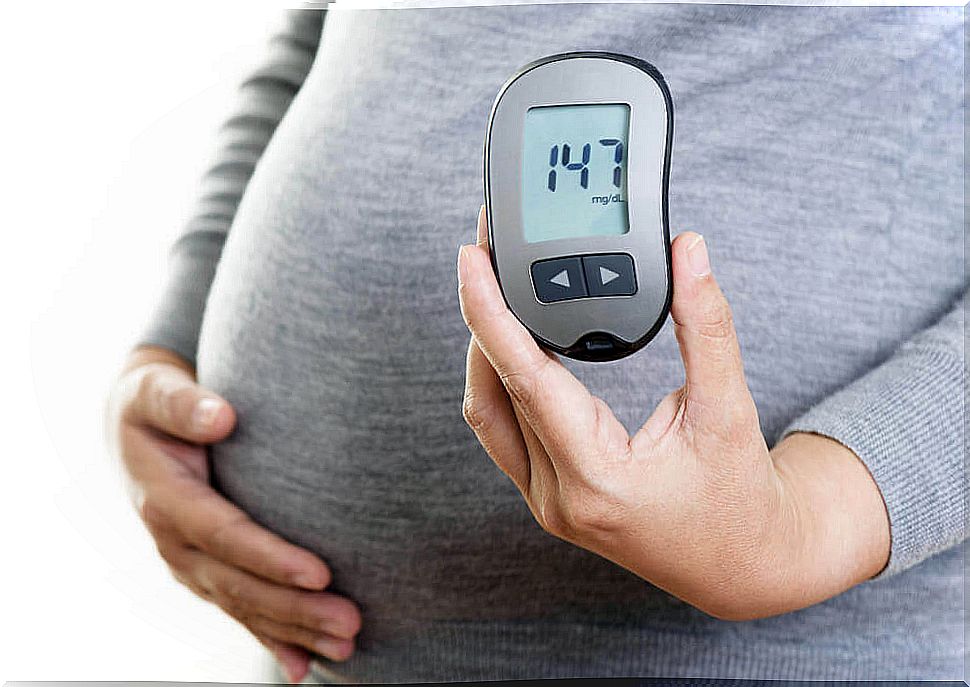Diabetes In Pregnancy: Causes And Treatments
Diabetes in pregnancy is also called gestational diabetes. Although in its bases the disorder is very similar to the other types of diabetes, it keeps its peculiarities for the vital moment in which it appears.
Ultimately, the pathophysiology of the disease is the same. The cells of the tissues cannot take up the glucose circulating in the blood and it rises above normal values for much of the day.
Statistics indicate that out of every one hundred women in a pregnancy, there are almost seven who suffer from diabetes in pregnancy. This represents a fairly high number and, for this reason, the measurement of blood glucose is included within the usual monitoring of pregnant women.
Scientific evidence affirms that, if it was pure gestational diabetes, once the pregnancy is over, the sugar values return to normal. This can take about twelve weeks to fully regularize. The problem is that the woman who suffered from the disorder has a much greater chance of developing type 2 diabetes in the future.
Causes of diabetes in pregnancy
The precise cause of the origin of diabetes in pregnancy is not entirely clear. It is known that the end result is the failure of cells to use blood glucose, but it is difficult to see why they do not.
In a normal digestive and nutritional process, glucose entering the body stimulates the pancreas to produce insulin. Insulin is a hormone that commands the tissues to absorb circulating sugar and not leave it in the blood. Always, under normal conditions, glucose enters the cells and is converted into energy for the functioning of metabolism.
In diabetes, this mechanism is blocked. It is known that in pregnancy the placenta is a hormone-producing organ. These various hormones have one characteristic in common: they inhibit the action of insulin. When the expected regulation gets out of control, then diabetes appears in pregnancy.

Risk factors for gestational diabetes
Not all pregnant women go through the situation of diabetes. In addition to the internal mechanisms that trigger it, risk factors have been identified that make women more prone to suffer from it. Among these factors we have:
- Diabetic history: whether the woman has had high blood glucose values in the past, or if one of her immediate relatives is diabetic, the risk will be higher.
- Diabetes in a previous pregnancy: if the woman has already suffered from gestational diabetes, then the risk of having it again is higher.
- Large babies: in the same way as the previous one, when a previous pregnancy culminated in a large baby – more than four kilos at birth – the possibility of diabetes in the current pregnancy is great.
- Obesity and overweight: Women who are overweight before becoming pregnant, or who gain excess weight during the course of pregnancy, often develop insulin resistance.

Treatment of diabetes in pregnant women
Diabetes in pregnancy poses a therapeutic challenge for clinicians. Many medications commonly used among type 2 diabetics are not suitable for pregnant women. Several of these drugs can alter the development of the fetus.
Therefore, the treatment requires strict control that seeks to control glycemia with changes in habits. To do this, it will first be essential to establish a routine for measuring blood sugar. Until stabilized, the pregnant woman can be asked to check her blood glucose several times during the day with a device designed for this purpose.
The diet during pregnancy is set strictly. Not only do you have to regulate your weight gain so as not to overdo it, but you also have to develop a diet plan that does not overload your body with glucose. The challenge is, for the nutritionist, to propose foods that do not increase blood glucose too much, while providing the necessary calories for the growth of the fetus.
The other pillar of treatment is physical exercise. Of course, it will be with the limitations that pregnancy generates. Exercise is able to stimulate cells to consume circulating blood sugar.
Finally, the treating physician will decide if medication is necessary. As oral antidiabetics are not recommended, injectable insulin is used. In addition, since the health of the baby is also part of this control, the doctor will order a greater number of ultrasounds and laboratories during the nine months.
In conclusion
Diabetes in pregnancy is a disorder that greatly complicates pregnancies. However, there are mechanisms to detect the alteration early and address it correctly. In this way, both mother and baby can go through the process with the least possible risk.
For this reason, it is important to comply with the pregnancy controls and follow the medical indications. If you have gestational diabetes, professionally supervised diet and exercise will be the mainstays of treatment.









